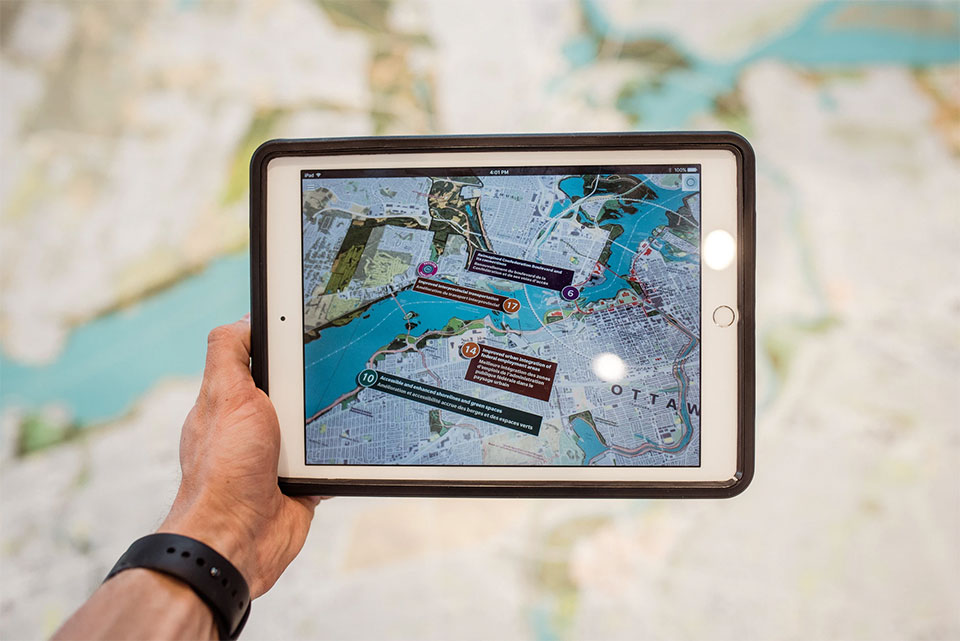Augmented reality (AR) In Business

Augmented reality (AR) technology has gained enormous popularity thanks to mobile games. The worldwide success of the Pokemon Go not only contributed to the development of gaming but also brought this innovative solution to the attention of other industries. Today, you can find AR in the industry, retail, and training sectors.
Augmented Reality vs Virtual Reality
Augmented reality is not the same as virtual reality (VR). Despite their apparent similarity, these technologies differ significantly from each other. VR allows the user to completely immerse himself in the virtual world, while AR only adds virtual elements to the real world, and a smartphone with a camera is enough to operate it. At NeuroSYS you can see several innovative projects using both VR and AR. As shown by IDC forecasts, the expenses related to the development of augmented reality are growing year by year. More and more software houses are undertaking advanced projects, providing custom IT solutions to their customers.
How to use Augmented reality (AR) in business?
The application of augmented reality in business at the moment is most evident in the trade sector. AR technology allows sellers, owners, and store managers to easily control the correct placement of goods on the shelves, according to customers’ preferences. Customers, in turn, have the opportunity to test the products before buying them. How does it work?
In the furniture industry, the use of the application that supports AR allows furnishing an apartment with virtual furniture, which translates into better decisions and increased interest of customers in products from the interior decoration category. Also, in the clothing and footwear industry, there are more and more opportunities to test how a given sweater or shoes will suit us. Simply select a given model in the mobile application and the camera installed in the smartphone will put it on our body. Augmented reality also works perfectly as store navigation. It will be triggered by indicating a specific product on the phone, to which we will be led by the shortest route, and we will even see its exact location on the shelf.
Software houses such as Neurosys, provide IT solutions also to the industrial sector. The augmented reality used, among others, in the training industry for assembly lines is also gaining in popularity. In the automotive sector, it is necessary to properly train new employees. Thanks to AR technology, it is possible to minimize the costs of such a project, conduct it more often, and even finish it with an exam confirming qualifications. A similar application can be found in the research sector and training courses on expensive specialist equipment for testing. Each user is guided step-by-step through the mobile device, showing him specific places where test tubes or measuring glass should be located.
Reasons why augmented reality is gaining popularity in the business world
It betters customer experience
Most industries that deal with clients directly are seeing a significant improvement in customer satisfaction. For instance, in the fashion industry, seeing how you would possibly look with specific clothing will give you a more definitive input. So much so, increasing the likeliness of getting precisely what you want and the business earning more.
It saves time and resources
This point will be emphasized by the example of AR being used in the real estate sector to hold augmented house tours. In such a case, as a potential homeowner, you may be able to foresee using projections by the system exactly how your home may turn out. This cuts down the time you would have used to ponder what you might do with the space behind the pantry or the extra space in the balcony. Though these model demonstrations, you save time and resources as now you will really not need a house tour guide.
It fastens learning and training
Since you have a hands-on approach to the subject in question, you grasp the concepts pretty instantly and faster than you would if it were in a classroom. Industries that have used this technology in teaching or training their staff find out that the information passed on is retained for a very long time since its more than just learning- it translates to living the teaching in reality.
It is fun
Nobody likes having to experience the same old things over and over, and Augmented Reality offers you the opportunity to play around and engage your mind. It basically strips off monotony bandage, which could very quickly kill the fun out of an activity. The fact that you are playing with the imagination, in reality, makes it fun. And regardless of the business, it becomes an anticipated activity- fashion, real estate, hospitality, or retail business.
Augmented reality, truly is the future!
Have you read?
The World’s Best Luxury Superyacht Charters And Builders.
Luxury Superyacht charter in Greece and the Greek Islands.
World’s Best Destinations For Business Travelers.
Crewed MegaYacht charter in Greece and the Greek Islands.
Bring the best of the CEOWORLD magazine's global journalism to audiences in the United States and around the world. - Add CEOWORLD magazine to your Google News feed.
Follow CEOWORLD magazine headlines on: Google News, LinkedIn, Twitter, and Facebook.
Copyright 2025 The CEOWORLD magazine. All rights reserved. This material (and any extract from it) must not be copied, redistributed or placed on any website, without CEOWORLD magazine' prior written consent. For media queries, please contact: info@ceoworld.biz









